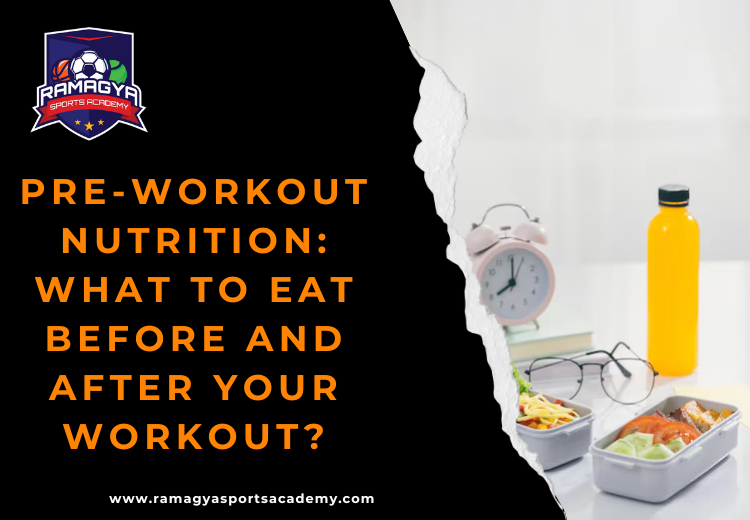
Exploring 17 Pilates Exercises for Strength and Stability
March 12, 2024
Contemporary Dance: Understanding its Wonders and Wellness Benefits
March 19, 2024Pre-Workout Nutrition: What to Eat Before and After Your Workout?
 To maximize the benefit from your exercises and accelerate recovery after that, eating right is absolutely key to reaching fitness goals. Giving your body a proper diet before and after exercising will improve performance, which would eventually lead to renewing muscles more quickly. This guide outlines which foods should be eaten before and after workouts to reach fitness goals more quickly.
To maximize the benefit from your exercises and accelerate recovery after that, eating right is absolutely key to reaching fitness goals. Giving your body a proper diet before and after exercising will improve performance, which would eventually lead to renewing muscles more quickly. This guide outlines which foods should be eaten before and after workouts to reach fitness goals more quickly.
Before Your Workout:
- Carbohydrates: For maximum results from intense workout, carbohydrates[1] are the best source. Eating enough of them as a pre workout meal ensures your muscles have ample glycogen levels available to them. For when physical exertion begins your body will not feel tired. Carbohydrates provide energy during prolonged or intense exercise by helping maintain glucose levels. The amount of carbs eaten prior to exercise depends on a range of factors, including duration and type of workout, metabolism rate of an individual and personal preferences. Generally, it’s advised that two or three hours prior to training, it’s best to consume moderate quantities. Experiment with high-carb food items like whole grains, fruit and starchy veggies in order to find out which ones provide you with lasting energy without feeling uncomfortable during training sessions.
- Protein: Consuming protein prior to exercising can benefit you due to a variety of reasons. First, eating protein as a pre workout meal improves the development of muscles. It also assists in repairing muscles in the whole body, which is crucial because exercises cause stress to the muscles’ fibers a lot. When you eat before exercising, your muscles will have access to amino acids that are required to repair and heal, which in turn enhance adaptability and increase strength. Pre-workout meals that contain protein can help stabilize blood sugar levels and provide sustained energy throughout your workout. Experiment with various sources, such as eggs, Greek yogurt, lean meats or plant-based alternatives, to see which best suits your performance and recovery needs.
- Hydration: Hydration prior to exercise is crucial to sustaining the highest level of performance and avoiding dehydration. Make sure your body has enough fluids to help support the physiological processes such as waste disposal, nutrition, and control of temperature. A well-hydrated workout can help you gain more strength, endurance and general abilities. The need to drink plenty of water prior to exercising, especially for prolonged or intensive sessions, can reduce the risk of suffering from heat-related problems. Replenish lost fluids by drinking water prior to the time you begin exercising to ensure that you’re hydrated before beginning your exercise.
After Your Workout:
It is very necessary to consume protein after exercise to aid in muscle growth as well as repair and recovery. Protein in the muscle breaks down because of the strain and damage exercises can cause to muscles. This encourages muscle development and adoption as time passes by, helping in recovering tiny tears within the muscles’ fibers. You should use proteins such as poultry, lean meats, eggs, fish, eggs, Greek yogurt or protein shakes. Alter your protein consumption in accordance with your individual diet and fitness goals to boost muscle growth and recovery post workout.- Carbohydrates: It’s essential to eat carbohydrates after training to replenish glycogen stores consumed when exercising. The muscles rely on glycogen as their main source of fuel while exercising, so refueling the glycogen stores after exercise promotes recovery of energy and muscle repair. Consuming carbs after working out also aids in promoting insulin release, which in turn helps muscle cells absorb glucose and boost the synthesis of glycogen. This speeds up muscle growth and repair and improves the healing process. Consuming carbs after exercise also lessens the likelihood of weariness and discomfort in the muscles by preventing muscular breakdown. To maximize post workout recovery and performance, modify your carbohydrate consumption based on variables including exercise intensity, duration, and specific nutritional needs.
- Hydration: Rehydrating after exercising is necessary to renew the loss of fluids from sweat. It also ensures your body’s process of healing. Sweating helps the body let out fluids that are required to keep the body’s temperature stable and improve performance during exercise. Rehydrating after exercise aids in ensuring fluid balance, protects against dehydration, and promotes the necessary recovery. In addition, drinking enough fluids after exercise can replenish glycogen reserves that are consumed during exercise. Also, make sure you drink electrolyte-rich beverages or fluids all day long to keep well-hydrated and improve overall well-being and health. For optimal rehydration and recovery, alter your intake of hydration based on factors like the intensity of your workout duration, duration, environmental conditions and your personal sweat rate.
Additional Tips:
- Post workout Meal Vegetarian: The purpose of a post workout vegetarian meal is to provide essential nutrients, promote muscle regeneration, replenish glycogen stores and support muscle growth and recovery. Be sure to include both proteins and carbohydrates for maximum effect in supporting muscle recovery and growth. Stir-frying tofu with mixed vegetables and quinoa would make an outstanding dinner, providing both protein and complex carbs while tofu is an excellent plant-based protein source. Add colorful vegetables such as broccoli, spinach and bell peppers to your breakfast diet for extra minerals, vitamins and antioxidants. Complete it by including avocado slices or small handfuls of seeds or nuts as sources of healthy fats; top it all off with spices or herbs for extra flavor! This balanced breakfast provides your body with essential nutrients necessary for maximum recovery post physical exercise.
- Timing: Timing pre and post workout meals is of paramount importance to maximize efficiency and recovery, with pre-workout meals typically eaten two or three hours prior to starting an exercise regime. Allowing your body to digest food properly and release energy through digestion gives it ample time to do its work, assuring your energy remains high and pain is minimized during physical activity. By making nutrients easily available during activity, timing helps maintain sustainable energy levels and minimize discomfort. Within 30-60 minutes after exercise, post workout meals or snacks should be consumed to replenish glycogen stores and promote muscle repair and growth. Doing this helps alleviate tiredness and soreness in muscles by optimizing nutrition intake and aiding recovery. Tailor meal timing according to personal tastes and intensity levels to optimize recovery and performance.
- Pre and Post Workout Meal Portions: Pre and post workout meal portion sizes depend on a range of variables, including fitness objectives, activity intensity and individual nutritional requirements. An optimal pre-workout breakfast should include both protein and carbohydrates in an appropriate portion two to three hours prior to exercising. An example serving could contain 10-20 grams of protein and 30-60 grams of carbs, depending on your workout type and weight. Post Workout meals that include both carbohydrates and proteins should support muscle regeneration and recovery. Within 30-60 minutes after finishing an exercise routine, aim to consume 20-30 grams of protein and 0.5 to 0.7 grams of carbs per pound of body weight – that should provide optimal muscle recovery results.
- Individual Preferences: Choosing meals before and after an exercise depends greatly on personal tastes. People may have a preference for quickly digested foods that give them consistent energy without making them uncomfortable to exercise before a workout. This can include things like a banana and protein powder smoothie, whole grain sandwiches with lean protein, or porridge with fruit and nuts. After a workout, tastes may tend toward foods that promote muscle repair and satiate hunger. While some people might like a simple snack like Greek yogurt with berries or a protein shake with almond milk, others might prefer a meal heavy in protein, like tofu stir-fry with quinoa and vegetables.
Conclusion:
Knowing what to eat before and after workout is one of the most important things for optimal and quick results. Pre-workout meals that will preserve energy and optimize muscle function should contain both carbs and proteins in equal portions, taken two to three hours prior to exercise. Select foods that are easy to digest so as not to interrupt your workout experience. Within 30-60 minutes after exercising, meals or snacks afterwards should focus on replenishing glycogen stores and supporting muscle recovery by including both carbohydrates and proteins in their mix. Choose foods rich in nutrients that promote healing, satisfy hunger and satisfy personal tastes. Incorporating these into your exercise routine and increasing performance may maximize the advantages and performance of each workout session by planning pre and post workout meals according to individual nutritional needs and preferences. It’s also important to pay attention to how your body responds during and after each session and remain well-hydrated throughout the day for maximum effect.Read our Article: 10 Essential Features That Define the Best Gym Experience at Ramagya Sports Academy



